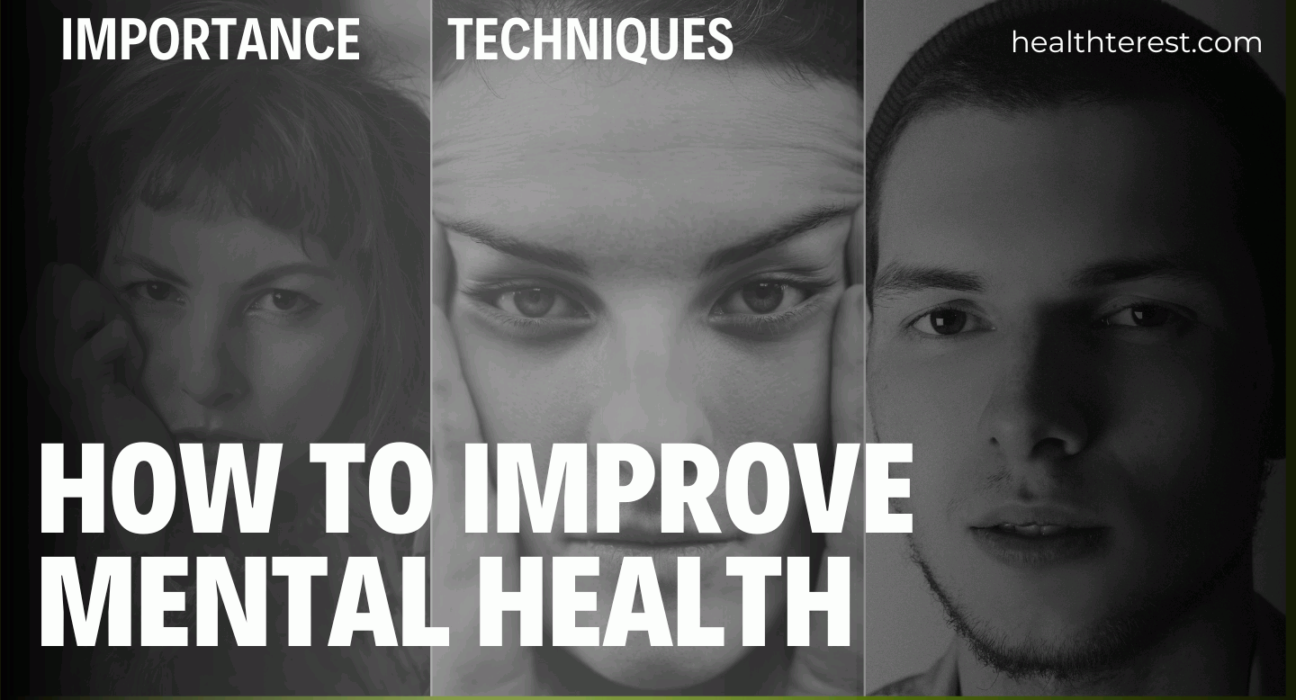Table of Contents
- Introduction
- Mental Health Definition
- Types of Mental Health Disorders
- 3.1 Mood Disorders
- 3.2 Anxiety Disorders
- 3.3 Psychotic Disorders
- 3.4 Eating Disorders
- 3.5 Personality Disorders
- 4. Importance of Mental Health
- 5. Mental Health Statistics
- 6. How to Improve Mental Health
- 6.1 Self-care Practices
- 6.2 Seeking Professional Help
- 6.3 Building Supportive Relationships
- 6.4 Engaging in Physical Activity
- 6.5 Practicing Mindfulness and Meditation
- 7. Benefits of Good Mental Health
- 8 .Conclusion
1. Introduction
Our minds are important. Mental health is about how we feel, think, and act. It affects our relationships and daily life. Mental health is key for living well. In recent years, many people realized how big a role mental health plays. This article talks about mental health. We’ll look at what it means, types of mental health issues, why it matters, some numbers, ways to improve it, and benefits of good mental health.
2. Mental Health Definition
Mental health refers to a state of well-being in which an individual can cope with the normal stresses of life, work productively, and contribute to their community. It involves emotional resilience, effective coping mechanisms, and the ability to form and maintain meaningful relationships.
3. Types of Mental Health Conditions
3.1 Mood Disorders
People who have mood troubles may feel sad or hopeless for a long time. They may also have big mood swings. Depression and bipolar disorder are examples of mood troubles. In these conditions, regulating moods becomes difficult.
3.2 Anxiety Disorders
Anxiety disorders mean lots of worry, fear, or worry. Disorders like worry disorder, panic attacks, and fears fall in this group. Anxiety disorders can make daily life and feeling good very hard.
3.3 Psychotic Disorders
Psychotic disorders like schizophrenia are mental illnesses. These disorders can cause problems with a person’s thoughts, perceptions, and behaviors. People with psychotic disorders may hear or see things that aren’t real. This is called hallucinating. They may also believe things that aren’t true. This is called having del.
3.4 Eating Disorders
Eating disorders are sicknesses. They involve strange eating habits. People with eating disorders worry a lot about their body weight and shape. Anorexia nervosa, bulimia nervosa, and binge-eating disorder are types of eating disorders. These disorders can cause serious health problems. They can also impact your mind and emotions.
3.5 Personality Disorders
Personality disorders involve enduring patterns of thoughts, feelings, and behaviors that deviate from cultural norms and cause distress or impairment. Examples include borderline personality disorder and narcissistic personality disorder.

4. Importance of Mental Health
Taking good care of your mind is super important. It affects how you feel every day. It also impacts your relationships, your work, and your body. Keeping your mental health strong helps you handle tough times. It boosts your coping skills too. Plus, it lowers your chances of having mental health issues.
5. Mental Health Statistics
Mental health disorders affect millions of people worldwide, with significant implications for individuals, families, and societies. According to recent statistics:
- Approximately 1 in 5 adults in the United States experiences mental illness each year.
- Depression is the leading cause of disability worldwide, affecting over 264 million people.
- Suicide is the second leading cause of death among individuals aged 15-29 globally.
6. How to Improve Mental Health
6.1 Self-care Practices
Engaging in self-care activities, such as adequate sleep, healthy eating, and regular exercise, can improve mood and overall well-being. Taking time for hobbies, relaxation, and mindfulness can also reduce stress and enhance mental resilience.
6.2 Seeking Professional Help
Therapy and counseling provide valuable support for managing mental health concerns. Licensed therapists offer evidence-based interventions, such as cognitive-behavioral therapy (CBT) and medication management, tailored to individual needs.
6.3 Building Supportive Relationships
Social support plays a crucial role in mental health. Cultivating meaningful connections with friends, family, and community members fosters a sense of belonging and provides emotional support during challenging times.
6.4 Engaging in Physical Activity
Moving your body often makes you feel better inside. When you exercise, your brain gives out happy chemicals. These chemicals are called endorphins. They make you feel calm and good. Exercise helps push away worry and sadness.
6.5 Practicing Mindfulness and Meditation
Being present is helpful. Taking time for deep breaths and quiet moments can relax the mind. Feeling less stressed allows people to think clearly. Mindfulness practices like meditation promote mental peace and emotional balance. Doing these activities each day benefits well-being.

7. Benefits of Good Mental Health
Maintaining good mental health offers numerous benefits, including:
- Improved resilience to stress and adversity
- Enhanced cognitive function and decision-making
- Stronger immune system function and physical health
- Greater satisfaction in relationships and daily activities
- Increased productivity and creativity
8. Conclusion
Mental health is critical for well-being. It involves emotions, thoughts, and relationships. Comprehending its meaning, various conditions, significance, data, and ways to enhance it is vital. Raising awareness and building resilience in people and communities requires prioritizing mental health. If you need help, get it – you can then live a happier, healthier life.




Leave feedback about this